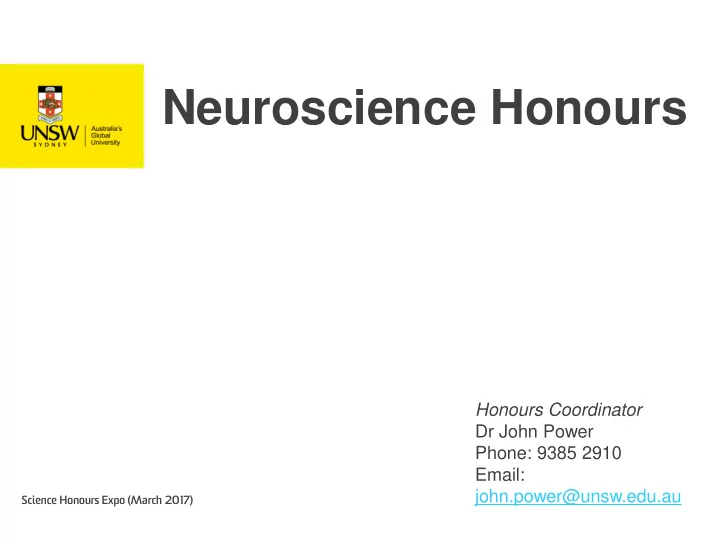

Neuroscience Honours Honours Coordinator Dr John Power Phone: 9385 2910 Email: john.power@unsw.edu.au Science Honours Expo (March 2017)
What is Neuroscience Honours? 4 th year research based program Akin to an internship – Embedded in a lab – Learn the business of scientific research Basic research skills Critical Thinking Experimental Design Proposal preparation Data analysis Communication of research
Neuroscience Honours Jointly operated by School of Medical Sciences School of Psychology Affiliated Institutes School of Psychiatry
Critical thinking skills, communication skills, basic research skills.
Structure of Program Research Project (80 - 90 % of your time) Research internship under guidance of supervisor – Basic research skills – Advanced disciplinary knowledge – Mentor you in all aspects of research » Experimental design, evaluation and synthesis of information, proposal and thesis preparation Coursework (10-20% of your time) – Provide broad knowledge base – Critical evaluation and communication skills Self directed learning
ASSESSMENT Project proposal 10% Research thesis 60% Lay Summary of thesis 5% 12.5% Coursework session 1 NEUR4411 - Behavioural Neuroscience 12.5% Coursework session 2 NEUR4421 – Biomedical Perspectives in Neuroscience
Fulltime Honours timeline May commence honours 1 month before start of term. T1 Week 1: Session 1 Coursework begins T1 Week 7: Research Proposal talk T1 Week 8: Written proposal due T2 Week 1: Session 2 Coursework begins T2 EOT: Thesis and Lay summary due
Part-time Honours May commence honours 1 month before start of term. T1 Week 12: Research Proposal talk T1 Week 13: Written proposal due T4 EOT: Thesis and Lay summary due Coursework taken T1 or T3 and T2 or T4.
NEUR4411 - Behavioural Neuroscience (T1) • neuroscience from a psychological perspective • 1 two hour session per week for 12 weeks • introduced to a range of techniques • taught how to critically evaluate the primary literature. • assessment by exam, essay and in class activities NEUR4421 – Biomedical Perspectives in Neuroscience (T2) • neuroscience from a biomedical science perspective • six half-day workshops during weeks 1-6 • introduces cutting-edge techniques • professional development • statistics and scientific writing • communication skills • assessment by student presentations, essay, completion of workshop tasks Coursework provides students with a broad knowledge base and appreciation of neuroscientific developments complementing the deep learning provided by the research project.
How does honours differ from undergraduate study? Basic research skills. Greater emphasis on critical thinking and communication skills Fewer assessment items More self-directed learning Professional workplace environment
Entry Requirements • 3 year full-time bachelor degree an overall WAM of ≥65% or Level III Science WAM ≥65%* • • prior “Neuroscience” Courses • acceptance by a supervisor * Applicants with overall WAMs between 60 to 64 and prior research of experience will be considered by committee
Project/supervisor allocation: The student is responsible for arranging a supervisor / project before applying for Honours. Prospective students are advised to consult the Neuroscience Honours website for the list of supervisors and their Honours research projects. The student may nominate up to three (3) supervisors in order of preference. It is expected that students introduce themselves and discuss projects with potential supervisors before nominating them on their application. 11
How to find a supervisor Researchers accepting Neuroscience Honours students are listed on the website https://medicalsciences.med.unsw.edu.au/students/undergraduate/neuroscience/ honours-supervisors Arrange a meeting with several supervisors
What makes a good supervisor / project? – Has time, Approachable / Open door / friendly – Knowledgeable in field, including latest research / passionate – Organised – some structure (regular meetings, sets goals with deadlines, responsible H&S) – Some guidance but not spoon feeding, then some independence – Clear expectations, know hons students new to research, – Honest assessment, feedback, help with assessments – Understanding, compassionate, patient, offers constructive criticism, – Interested in the student's progress and encourages ideas – Involved in project, Provides guidance without spoon-feeding – Flexible / adaptable – Provide them with the opportunities to present and discuss results Survey of former honours students
Things to consider Research Interests Research Project Research Environment Your needs / personality – How much supervision you need / desire? – Flexible project or well-defined project?
supervision Harmony Get matched with a supervisor you’re truly compatible with Simply arrange a meeting via email
Research Information Nights SoMS, Psychology and NeuRA have research information nights in September Chance to meet with researchers and current students 2 nd and 3 rd year science students will be notified in July / August
What to expect for the honours year To work harder and longer than you ever have Minimum 5 days a week every week A first class honours takes commitment Vacation time to be worked out with supervisor Experiments will fail Experiments will work Experiments will fail again The unexpected will happen Things will work again You will finish You will sleep well on Nov 6 th (submission date)
Can I hold down a job outside of honours? Yes, BUT… • Honours is an intense research internship. • Full-time student = full-time job. Consider part-time honours.
Post-honours options? Higher degree research Medicine, Dentistry, Nursing, Allied Health Research Assistant Government Body (Therapeutic Goods Administration) Scientific Sales Patent analyst Science journalism Think outside the box transferable skills (clear & concise communication, experimental design, critical analysis, troubleshooting)
https://medicalsciences.med.unsw.edu.au/students/undergraduate/ neuroscience/honours
Recommend
More recommend